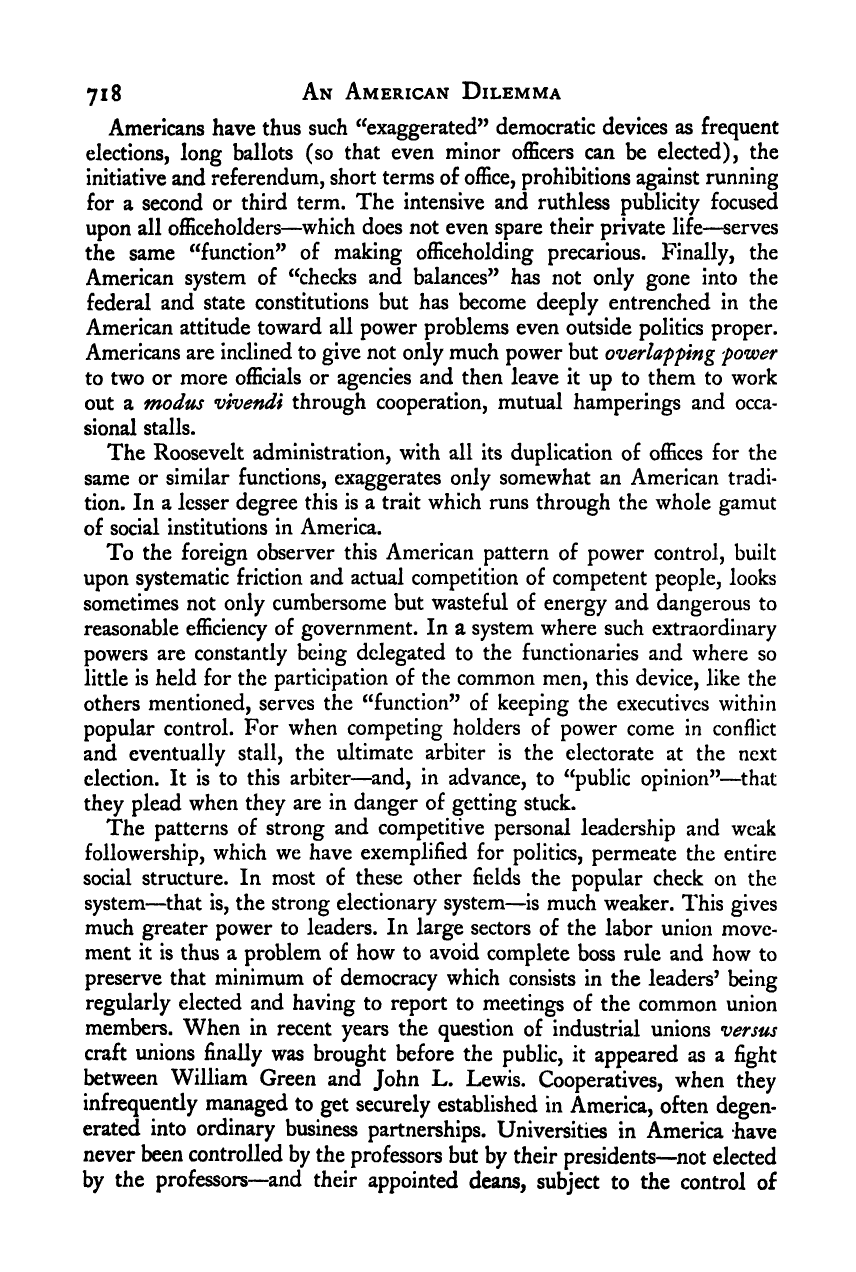Note: Gunnar Myrdal died in 1987, less than 70 years ago. Therefore, this work is protected by copyright, restricting your legal rights to reproduce it. However, you are welcome to view it on screen, as you do now. Read more about copyright.
Full resolution (TIFF) - On this page / på denna sida - IX. Leadership and Concerted Action - 33. The American Pattern of Individual Leadership and Mass Passivity - 4. The Patterns Exemplified in Politics and throughout the American Social Structure

<< prev. page << föreg. sida << >> nästa sida >> next page >>
Below is the raw OCR text
from the above scanned image.
Do you see an error? Proofread the page now!
Här nedan syns maskintolkade texten från faksimilbilden ovan.
Ser du något fel? Korrekturläs sidan nu!
This page has never been proofread. / Denna sida har aldrig korrekturlästs.
71 8 An American Dilemma
Americans have thus such ^^exaggerated” democratic devices as frequent
elections, long ballots (so that even minor officers can be elected), the
initiative and referendum, short terms of office, prohibitions against running
for a second or third term. The intensive and ruthless publicity focused
upon all officeholders—which does not even spare their private life—^serves
the same ^Tunction” of making officeholding precarious. Finally, the
American system of ^^checks and balances” has not only gone into the
federal and state constitutions but has become deeply entrenched in the
American attitude toward all power problems even outside politics proper.
Americans are inclined to give not only much power but overlafping power
to two or more officials or agencies and then leave it up to them to work
out a modus vivendi through cooperation, mutual hamperings and occa-
sional stalls.
The Roosevelt administration, with all its duplication of offices for the
same or similar functions, exaggerates only somewhat an American tradi-
tion. In a lesser degree this is a trait which runs through the whole gamut
of social institutions in America.
To the foreign observer this American pattern of power control, built
upon systematic friction and actual competition of competent people, looks
sometimes not only cumbersome but wasteful of energy and dangerous to
reasonable efficiency of government. In a system where such extraordinary
powers are constantly being delegated to the functionaries and where so
little is held for the participation of the common men, this device, like the
others mentioned, serves the ‘‘function” of keeping the executives within
popular control. For when competing holders of power come in conflict
and eventually stall, the ultimate arbiter is the electorate at the next
election. It is to this arbiter—and, in advance, to “public opinion”—that
they plead when they are in danger of getting stuck.
The patterns of strong and competitive personal leadership and weak
followership, which we have exemplified for politics, permeate the entire
social structure. In most of these other fields the popular check on the
system—that is, the strong electionary system—is much weaker. This gives
much greater power to leaders. In large sectors of the labor union move-
ment it is thus a problem of how to avoid complete boss rule and how to
preserve that minimum of democracy which consists in the leaders’ being
regularly elected and having to report to meetings of the common union
members. When in recent years the question of industrial unions versus
craft unions finally was brought before the public, it appeared as a fight
between William Green and John L. Lewis. Cooperatives, when they
infrequently managed to get securely established in America, often degen-
erated into ordinary business partnerships. Universities in America have
never been controlled by the professors but by their presidents—^not elected
by the professors—and their appointed deans, subject to the control of
<< prev. page << föreg. sida << >> nästa sida >> next page >>